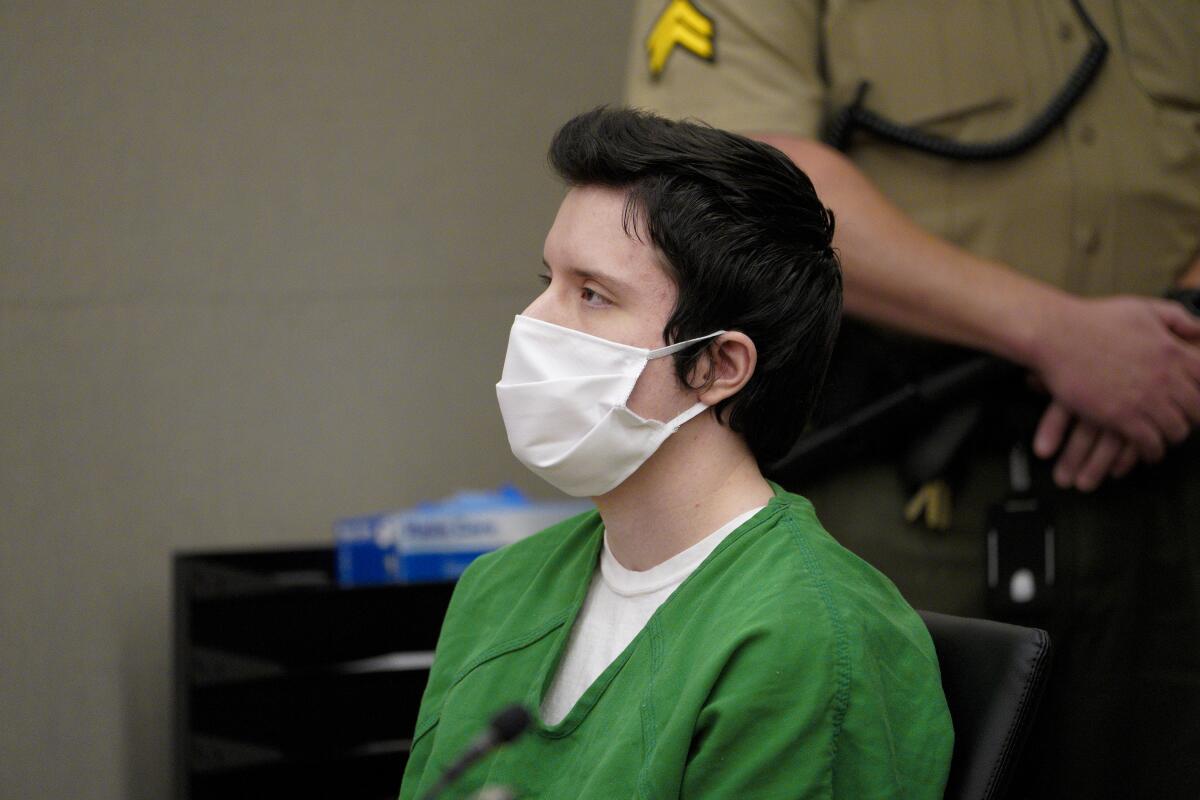Poway synagogue shooter gets federal life sentence

The man who opened fire on a Poway synagogue in a deadly antisemitic attack was sentenced in San Diego federal court Tuesday to life in prison, plus 30 years. The hearing marks the final chapter in the dual prosecution of John T. Earnest and adds to the life term that was handed down to him three months earlier in state court.
Earnest, 22, pleaded guilty in September to a 113-count federal indictment that charged him with civil rights, hate crimes and weapons charges stemming from the April 27, 2019, attack on the synagogue at Chabad of Poway and arson at the Dar-ul-Arqam mosque in Escondido about a month earlier.
The shooting killed Lori Gilbert-Kaye, 60, and wounded the founding Rabbi Yisroel Goldstein, 8-year-old Noya Dahan and her 34-year-old uncle, Almog Peretz.
Earnest was also charged with state charges of murder, attempted murder and hate crimes in San Diego Superior Court. In July, he pleaded guilty to those charges in a deal with prosecutors that allowed him to avoid the death penalty and instead get a sentence of life in prison without parole.
The attacks came during a Passover service at the synagogue. Both state and federal prosecutors said Earnest, then a 19-year-old student studying to be a nurse at Cal State San Marcos who had led an unremarkable suburban life in Rancho Peñasquitos, was driven by fierce hatred of Jewish people.
Shortly before the attack, Earnest had posted a screed online full of racist and antisemitic statements that declared the “European race” must be protected. He praised the March 2019 mass shootings at New Zealand mosques, attacks that left 51 people dead, and referenced the accused gunman in an October 2018 attack at the Tree of Life synagogue in Pittsburgh, where 11 people were shot and killed.
A gunman armed with a semiautomatic rifle walked into a suburban San Diego County synagogue and opened fire on the congregation Saturday, killing one person and injuring three in an attack that authorities believe was motivated by hate.
In the “open letter,” Earnest said he had planned the attack for at least a month, and also admitted he set the fire at the mosque.
In a series of hearings in both state and federal court, Earnest has shown little emotion and less regret. At a preliminary hearing in state court in September 2019, he smirked and smiled during testimony about the attack, and at a lunch break in the hearing, he turned toward spectators and made a “hang-loose” gesture with one hand, thumb and little finger extended.
Yet in a sentencing memorandum filed last week, his federal defense lawyers argued that Earnest has turned a corner. Lawyers wrote that Earnest condemned his actions in a phone call from jail that apparently was recorded.
However, those comments came two days after jail officials found a document in Earnest’s jail cell in which he again advocated for violence against Jews. Defense lawyers downplayed that by saying it was written long before his apparent condemnation of violence.
The lawyers also wanted Earnest to spend his sentence in a state prison, where he would be closer to his family. They said that would help his rehabilitation. But federal prosecutors instead wanted to have Earnest imprisoned at the super-maximum security federal prison in Florence, Colo. — the same facility where notorious criminals such as Sinaloa cartel kingpin Joaquín “El Chapo” Guzmán and Boston Marathon bomber Dzhokhar Tsarnaev are housed.
U.S. District Court Judge Anthony Battaglia said he would recommend that Earnest serve the sentence in federal custody, although it will be up to the U.S. Bureau of Prisons to accept him. It was not immediately clear whether or how state corrections officials would be included in that decision.
The lawyers said that the turnabout in Earnest’s life from fledgling nurse to armed hatemonger could be attributed to the “rapid online radicalization” that exploited Earnest’s still-developing immature brain.
They wrote that his road to “a good, productive life was unfortunately interrupted by a young, still-growing and immature mind, the mind of a youth who was still trying to identify who he was and left Mr. Earnest to being vulnerable to peer pressure and a fear of exclusion.”
More to Read
Sign up for Essential California
The most important California stories and recommendations in your inbox every morning.
You may occasionally receive promotional content from the Los Angeles Times.











